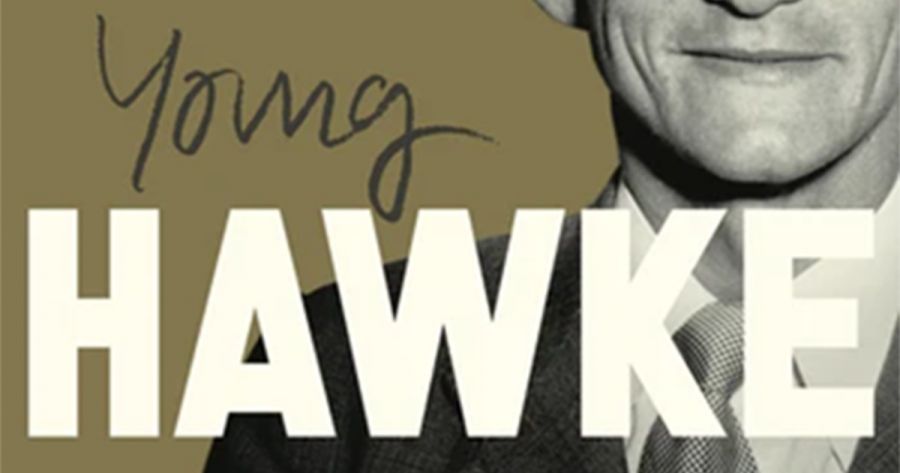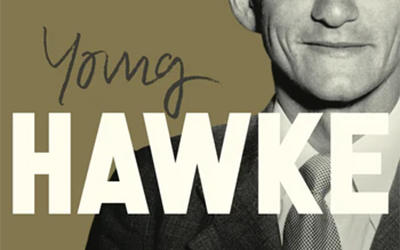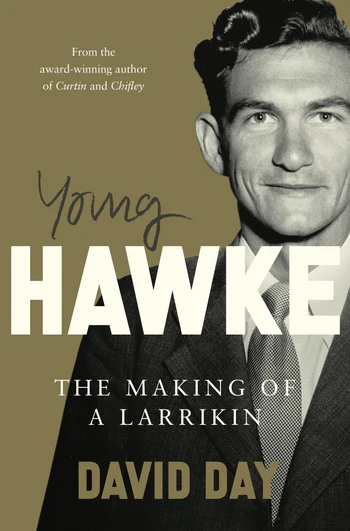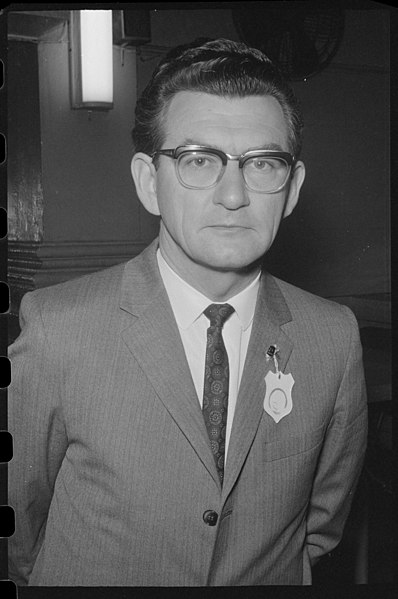
- Free Article: No
- Contents Category: Politics
- Review Article: Yes
- Article Title: Making a gargoyle
- Article Subtitle: The larrikin who became prime minister
- Online Only: No
- Custom Highlight Text:
It is easy to imagine book-buyers nodding with approval at the subtitle of this biography: ‘The making of a larrikin’. With ‘larrikin’ today applied to knockabout young men who are irreverent and mischievous but genuinely good-hearted, Bob Hawke seems a quintessential example. Yes, the myth goes, he used slipshod language now and then, and was quite a sight when he was in his cups, but generally Hawkie was a top bloke, a man who would call a spade a spade, a mate who could sup with princes and paupers but never forget who he was.
- Featured Image (400px * 250px):

- Alt Tag (Featured Image): Patrick Mullins reviews ‘Young Hawke: The making of a larrikin’ by David Day
- Book 1 Title: Young Hawke
- Book 1 Subtitle: The making of a larrikin
- Book 1 Biblio: HarperCollins, $49.99 hb, 430 pp
- Book 1 Cover Small (400 x 600):

- Book 1 Cover (800 x 1200):

Bob Hawke never threw a brick, so far as his biographers have shown, but in so many other ways he was a grotesque and menacing lout much in the mould of the 1870s larrikin. This is a man who propositioned a woman and, when rebuffed, spat that she was ugly, anyway; who took his daughter to a party and, while there, told a woman sitting by her husband that he would like to fuck her; who drunkenly poured himself out of his car to scream at neighbourhood children for using the tennis court his wife had invited them to play on; who accepted a ‘Father of the Year’ award he had done nothing to deserve and posed as a family man to rebut accurate rumours of infidelity and publicly attested chauvinism; and who may well have sold out the nation’s truckies in exchange for trinkets and treats from transport magnate Peter Abeles.
David Day, author of Young Hawke, is not the first person to lay bare the gargoyle that became Australia’s twenty-third prime minister: that job was in large part performed by Blanche D’Alpuget, whose 1982 biography famously included disclosure of Hawke’s womanising and drinking. Produced while D’Alpuget and Hawke were in a sexual relationship, and published shortly before he became Labor’s leader and then, within weeks, prime minister in 1983, D’Alpuget’s account had its gaps and silences, particularly around Hawke’s sex life and drinking. Troy Bramston’s 2022 biography did much to fill those gaps, occasionally luridly.
There is reason, then, to greet Day’s account, seemingly the first in a two-volume biography, with a degree of scepticism. What more can be said? What is still unknown about a man who lived the greater part of his life in the public eye, who was always in newsprint, and who has been the subject of five previous biographies?
 Bob Hawke, 1968 (Mitchell Library, State Library of New South Wales and Courtesy SEARCH Foundation, via Wikimedia Commons)
Bob Hawke, 1968 (Mitchell Library, State Library of New South Wales and Courtesy SEARCH Foundation, via Wikimedia Commons)
Day’s first answer comes from his laudable habit – shown in his biographies of other Labor figures, including prime ministers Andrew Fisher, John Curtin, Ben Chifley, and Paul Keating – of picking over bones discarded or ignored by other biographers. In Young Hawke, this is most obvious in Day’s account of Hawke’s childhood. For the religiously fervent Clem and Ellie Hawke, church activities were paramount in their lives: their days were filled with services, socials, camps, classes, dances, door-knockings, and more. When they had time and attention to spare, it was lavished on Neil, their golden child, older and taller and more handsome than Bobbie, better at school and more popular, too. Even when Neil was away at boarding school, even when Clem and Ellie took a night off, young Hawke still ranked below the girls and women who were invited to stay at the manse, who turned it into an ‘indoor camp under strict camp routine’.
Day’s attention to the dynamics of this upbringing gives what follows valuable depth and psychological nuance. Day is not the first of Hawke’s biographers to call Hawke a narcissist, but he takes narcissism seriously enough to parse its manifestations and contradictions and to follow its influence through Hawke’s life. Hawke’s heightened level of self-love may well have been a compensation for the conditional and anxiety-ridden love he received from his parents; their assurances that he was special might well have exacerbated that and fuelled his determination to become a Rhodes Scholar and, eventually, prime minister. That narcissism, and its need for reassurance and reinforcement, might have provided the pangs in Hawke’s insatiable appetite for sex and his unquenchable thirst for alcohol.
Some of the psychologising from genealogical evidence is unpersuasive; at times Day’s speculations unnecessarily harden into statements of fact. He writes in an introductory note that Clem Hawke lost his position in the Methodist church at Forster ‘because of his affair with his future wife’ and that Clem’s running his ‘horse and cart off the road’ is a glimpse of the ‘wildness’ that his son inherited. However, when Day describes these events in the main text, the certainty and significance vanish: the affair becomes a possible explanation, the ‘pony and trap’ going off-road is attributed to pressure that precedes Clem’s nervous breakdown. At other times, Day’s claims for profound significance are unrewarded. The tennis-court death in Hawke’s arms of businessman Lionel Revelman, while Hawke was president of the ACTU, was ‘one of the most traumatic experiences of Hawke’s life’, Day writes – but how it influenced Hawke afterwards, if at all, is unsaid.
Day’s second answer to the utility of his book comes toward the end of Young Hawke, as his subject agonises over giving up the comfort and prestige he has accumulated, as president of the ACTU, and going into Parliament to realise that chancy childhood ambition of becoming prime minister. There were dilemmas and contingencies at every turn; costs and compromises that were demanded from Hawke. His mother was dying; opponents in Labor were trying to kneecap him; his marriage with Hazel was on the brink; his lover, D’Alpuget, was considering suicide but also writing his biography and saying that she could not end on ‘a note of regret, of hope abandoned’.
Given the power of Hawke’s narcissistic self-belief, his decision was never really in question. But in these pages, the drama and the value derive from whether all those contemporaries who excused the youthful, larrikin Hawke, ignored his ugly words and deeds, and disguised the revulsion that his behaviour so often engendered might be vindicated. They had all rationalised their silence by making a comparison with what Hawke might be and what contribution he might make if he realised his ambition and became prime minister. Were those decisions justified? Were they redeemed?
The answer awaits a successor volume. As David Day writes, Hawke had made his mark already. Now, greater opportunities and challenges lay ahead.


Comments powered by CComment